| |
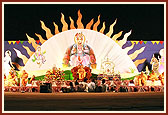 |
- 18 April 2005
(V.S. 2061, Chaitra sud 9) Monday, Amdavad; Shri Hari Jayanti
At 5.20 pm Swamishri
left Gadhada and arrived at Amdavad mandir at 8.00 pm. After
darshan of Thakorji, Swamishri came to the 224th birthday celebration
festival of Bhagwan Swaminarayan.
|
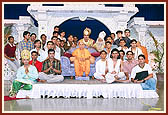 |
- 23 April 2005
(V.S. 2061, Chaitra sud 14) Saturday, Amdavad
In the evening assembly
BAPS youths performed a drama, ‘Bharat nu Sohamanu Swapna’,
which portrayed icons of self-confidence, self-realisation,
austerity and others from India’s glorious past. Finally
Swamishri blessed the assembly, “Today people do not like
religious talks. The atmosphere is such that one forgets about
the importance of character and culture. Because of TV and websites
the lessons of self-discipline are fading. When there is no
discrimination between right and wrong one becomes inclined
towards bad things. When one listens to bad things and eats
non-veg then how can one do satsang? Yogiji Maharaj willed for
a better, character-based society. Through his desire the activities
are going on. His work was to redeem all and make them happier.
He was pure and in control of his ten senses and speech…”
|
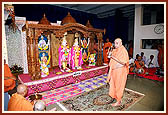 |
- 24 April 2005
(V.S. 2061, Chaitra sud 15) Sunday, Amdavad
Swamishri performed the
murti-pratishtha rituals of pujan and arti of Akshar Purushottam
Maharaj, Guru Parampara, Hanumanji and Ganapati for the BAPS
hari mandir in Mahijada. Thereafter Swamishri blessed the devotees.
|
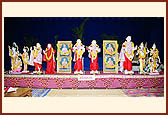 |
- 27 April 2005
(V.S. 2061, Chaitra vad 3) Wednesday, Amdavad
After his morning puja
Swamishri performed the murti-pratishtha rituals of murtis of
Akshar Purushottam Maharaj, Ghanshyam Maharaj, Guru Parampara,
Radha-Krishna Dev, Sita-Ram, Shiv-Parvati, Hanumanji and Ganapati
for the hari mandirs in the Amdavad suburbs of Maninagar and
Nava Vadaj. Swamishri also performed the foundation- stone laying
rituals of three new hari mandirs to be built in the suburbs
of Nirnaynagar, Nikol and Chandlodia.
At 11.00 am Swamishri honoured the renowned Sanskrit pundit
of Gujarat Shri K. Ka. Shastri who had completed 100 years with
a garland and shawl.
|
| |
- 28 April 2005
(V.S. 2061, Chaitra vad 4 & 5) Thursday, Amdavad
In the evening satsang
assembly a renowned management consultant, Shri B.N. Dastur,
said, “I have taken management training from many people
in India and abroad. But I consider my guru to be Bhagwan Shri
Krishna. He has wonderfully talked about management in the Bhagvad
Gita. He says Adhishthãnam… devam chaivatra panchamam.
To successfully perform action he has prescribed five elements:
(1) Environment: Every person who desires to do some
work requires a proper atmosphere and means. (2) Doer:
The doer does the action. The BAPS organisation is running successfully
through the help of 700 sadhus and thousands of people. This
shows that there is a doer who is pouring his soul for the mission.
(3) Karan: Means resources. To acquire money as a resource
is not difficult, but human resource is difficult to get. That
is the most important. The best application of human resources
that I have ever seen is in this Sanstha. (4) Cheshta:
Means process. You have money, but how to use it; this process
is difficult. This Sanstha uses every penny in the best possible
way. (5) Nasib: Means fate, but this is very subsidiary.
“This is my favourite shlok. Till now, in my 70 years
of life I have had lots of experiences, but I have not met a
manager who has realised this shlok. I came here one year ago
and got the opportunity of seeing the Sanstha’s activities
and implementation of work. Then I realised that in the 70 years
of my life the person who has realised the management shlok
from the Gita is Pramukh Swami Maharaj. I am over 70 years old.
There is nothing more to achieve in living up to 100 years,
but whatever I have left to live I am ready to offer them in
the service of Pramukh Swami Maharaj.”
Thereafter Swamishri blessed the assembly, “Shri Dasturji
has spoken briefly, but very well. He has written many books
on management and spoken on it, too. Everyone has to manage.
You have to manage your wife, children and others. People manage
to get self-praise. In fact a person should live such a life
that everyone naturally likes him. If you have character, morality,
full faith and trust in God then people will naturally love
and respect you. But if your life is not good then no matter
what you do no one will truly love you. Because you are great
in worldly ways people have to tell you that you are good, but
there is no respect and love from the heart. The great sadhus
and devotees have given us love, so we revere and love them.
We accept their preachings because they have lived in such a
way that it is an inspiration for us. Shriji Maharaj told his
sadhus that your life will speak. He gave them five vows, and
by following them people will be inspired with faith in God
and adhere to satsang. The better one’s life, the easier
the work becomes. Through bad external influences man spoils
his life.
“There is peace with the devotees of God. But people believe
there is peace in money and power. Through them one gets comfort
and physical happiness, but not God’s happiness. Tulsidas
says that through God and His realised Sadhu one gets peace
and happiness in all one’s work. Today there is conflict
for money and power. When one walks with arrogance one becomes
a target for others. By remaining humble one feels inferior,
but in our shastras the stories of humble people show they became
great.
“Yogiji Maharaj was a servant to all. He folded his hands
to all. Other sadhus and devotees have remained humble and sung
the virtues of others, and therefore everyone loves them. No
one remembers those who became great because of money and power.
We remember humble people life Narsinh, Mira, Ambrish, national
leaders and Ravishankar Maharaj. It has been said that when
a tree bears fruits its branches bend low. Similarly, such sadhus
and devotees meet everyone with humility and politeness. If
anyone beats them still they praise them. We have people of
such calibre like Shastriji Maharaj and Yogiji Maharaj, therefore
we have got the benefit of becoming a servant of servants. May
we adopt this virtue and please Maharaj.”
Swamishri succinctly emphasised the virtues of character, humility
and faith in God as the principles of management.
|
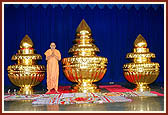 |
- 29 April 2005
(V.S. 2061, Chaitra vad 6) Friday, Amdavad
During Swamishri’s
morning puja, the stage was embellished with five kalashes that
would crown the shikhars of Akshardham in New Delhi. During
Swamishri’s puja, Dr. Swami, Ishwarcharan Swami, Viveksagar
Swami and other sadhus performed the mahapuja rituals for the
kalashes. Thereafter Swamishri placed Shri Harikrishna Maharaj
on and worshipped the main kalash, standing at 8’4”
with a circumference of 6’. Swamishri performed pujan,
showered flower petals and rice grains and finally performed
arti of all the kalashes. Swamishri also performed the pujan
rituals of the giant 23’9” long flagpost weighing
450 kg.
Swamishri was extremely pleased by the quality of the kalashes
and blessed the sadhus and devotees involved in making them.
|
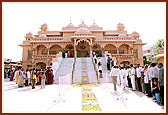 |
- 30 April 2005
(V.S. 2061, Chaitra vad 7) Saturday, Amdavad
In the morning Swamishri
visited the newly built BAPS Swaminarayan mandir in the suburb
of Nava Vadaj. After performing pujan and arti Swamishri blessed
the assembly.
In the evening assembly Swamishri arrived to see the 2 hr 15
min. drama, ‘Chalo Chale Ham Akshardham’. The drama
showed how an atheist was transformed by his visit to Akshardham
in New Delhi through its social, moral and spiritual impact
on humanity.
|
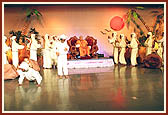 |
- 1 May 2005
(V.S. 2061 Chaitra vad 8) Sunday, Amdavad
In the evening assembly
a wonderful drama presentation by BAPS children conveyed the
message of successful study and character. Finally Swamishri
blessed the assembly.
|
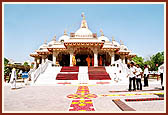 |
- 2 May 2005
(V.S. 2061, Chaitra vad 9) Monday, Amdavad
At 10:30 am Swamishri
departed for the suburb of Maninagar. Here, at the newly constructed
BAPS Swaminarayan mandir Swamishri consecrated the charanarvind
(footprints) of Bhagwan Swaminarayan. Thereafter he performed
the pujan and arti rituals of the murtis. In his blessings to
the assembly Swamishri said, “Shriji Maharaj and sadhus
have been to Maninagar so this place is a holy place. Due to
the efforts of sadhus the Satsang has grown here so we were
inspired to create a mandir here for the benefit of society…”
|
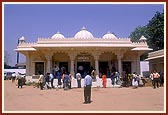 |
- 6 May 2005
(V.S. 2061, Chaitra vad 13) Friday, Amdavad
At 10.15 am Swamishri
departed from Amdavad mandir and arrived at the newly inaugurated
BAPS Swaminarayan mandir in the suburb of Odhav. Here Swamishri
performed pujan and arti rituals of the murtis and blessed the
assembly.
|
|
|











